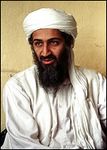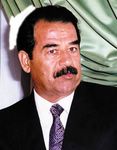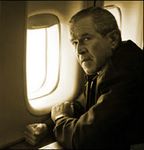
He failed to send U.S. troops after bin Laden at Tora Bora, allowing Afghan sympathizers to spirit the terrorist to safety in Pakistan, where he has been ensconced for the past five years. Bin Laden was responsible for the deaths of the 2,973 people who died in the September 11 attacks. Bush, in a brilliant stroke of legerdemain, persuaded Americans that capturing Osama, with whom his family had done business for decades, was no longer important. Saddam Hussein, who never attacked the United States, became the new bogeyman.

By whipping up a national frenzy for an unprovoked escapade in Iraq, the president bolstered his poll numbers and greatly helped Dick Cheney's Halliburton with $10 billion worth of contracts. He was not able, however, to bring peace and democracy to Iraq at the point of a gun. It did not help that his first action was to tell thousands of Iraqi men with weapons they were no longer wanted and cut off their income. By disbanding the army he set the stage for the civil war to follow.

If Americans thought the war would be over once U.S. soldiers marched into Baghdad and located those dangerous WMDs, they were sadly mistaken.
Bush's own chief arms inspector, David Kay, completely debunked the WMD myth last January. He reported there were no WMDs in Iraq, and probably hadn't been any for a decade.
Rather than declaring victory and withdrawing U.S. forces, Bush merely changed his rationale for the U.S. invastion and occupation. He said the U.S. would not leave until Iraqis had a constitution. Once that was achieved, warring factions went back to killing each other and U.S. soldiers. Bush changed his reason for keeping U.S. soldiers in Iraq one more time.
Despite growing opposition to the war among U.S. voters and our allies, the president continues to stick to an unattainable benchmark for withdrawing soldiers from Iraq's civil war: stability in a country with three armed sects who love killing each other.
One of Bush's main concerns now seems to be, not the safety of U.S. troops, but the increasing use by the media of the term civil war to describe the fighting in Iraq. Bush may be the last person on the planet who believes the fighting will be less nasty if you don't call it a civil war. He prefers to call it "sectarian violence."
"Anyone who still remains in doubt about whether this is civil war is suffering from the luxury of distance," CNN reporter Michael Ware reported Monday from Baghdad. Months ago, after the February 22 bombing of the holy Shiite mosque at Samarra, former Iraqi Prime Minister Ayad Allawai said “If this is not civil war, then God knows what civil war is."
RIGA, Latvia (AP) -- President Bush, under pressure to change direction in Iraq, said Tuesday he will not be persuaded by any calls to withdraw American troops before the country is stabilized.
''There's one thing I'm not going to do, I'm not going to pull our troops off the battlefield before the mission is complete,'' he said in a speech setting the stage for high-stakes meetings with the Iraqi prime minister later this week. ''We can accept nothing less than victory for our children and our grandchildren.''
No comments:
Post a Comment